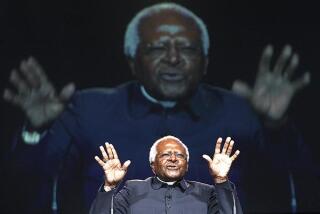Mandela Gives Clinton a Lecture on Libya, Cuba
- Share via
CAPE TOWN, South Africa — Exhibiting the moral authority he draws from his extraordinary personal history, South African President Nelson Mandela on Friday pointedly told President Clinton to follow his lead and negotiate face-to-face with his enemies to solve conflicts peacefully.
Mandela added that he intends to remain “loyal” to old friends--such as Cuba and Libya--even if it displeases the Clinton administration.
“The United States as the leader of the world should set an example to all of us to help eliminate tensions throughout the world,” an energized Mandela said at a joint news conference with Clinton. “And the best way of doing so is to call upon its enemies to say, ‘Let’s sit down and talk peace.’ ”
Clinton smiled throughout the news conference despite Mandela’s admonitions.
The unusual public tutorial for the leader of the world’s only superpower by the head of a small, friendly nation would seem audacious except for the unique biography of the teacher. Mandela spent three decades as a political prisoner and standard-bearer in the fight against South Africa’s apartheid regime, and he lived to lead his nation’s peaceful transition to a democracy that embraces all races.
“That was quite a poignant moment: Here we are, little South Africa in the middle of nowhere, talking that way to Bill Clinton, with him standing right next to him,” said a senior South African official, who asked not to be named.
Mandela’s comments underscored his determination to forge a partnership with the United States in which open disagreements are possible without souring the relationship.
At the same time, he spoke warmly of his friendship with Clinton and called the first-ever visit of an American president here a “high-water mark” for the new, free South Africa.
Clinton, in turn, hailed Mandela’s path from prison to the presidency as “one of the true heroic stories of the 20th century.”
Later in the day, the two presidents made an emotional journey to Robben Island, the prison compound where Mandela spent 18 years. With their arms around each other, they walked down a long, gray corridor and, pausing in front of cell No. 5, Mandela said, “This was home.”
Gripping the window bars, Clinton looked out on the high-walled courtyard where Mandela once tended a garden and hid the handwritten notes that became his autobiography.
“Thank God that the person who occupied this cell was able to live all those years in that way without having his heart turn to stone,” Clinton said.
The two also toured the limestone quarry where Mandela toiled for many years, labor that severely damaged his eyesight.
The remarkable thing about Mandela, Clinton told reporters earlier, is that he emerged after 27 years in prison “not in anger, but in hope, passion, determination to put things right in a spirit of reconciliation and harmony.”
The same principles that triumphed over apartheid also guide his relationships with Fidel Castro of Cuba, Moammar Kadafi of Libya and others considered outlaw leaders by the United States, Mandela said.
“Our moral authority dictates that we should not abandon those who helped us in the darkest hour in the history of this country,” Mandela said, referring to the apartheid years. “Not only did they support us in rhetoric, they gave us the resources for us to conduct the struggle.”
South Africans who criticize him for those relationships, Mandela added, “can go and throw themselves in the pool.”
Libya’s government is suspected of sponsoring terrorism, and it has steadfastly refused to hand over suspects in the 1988 bombing of Pan Am Flight 103 over Lockerbie, Scotland. The United States, which has tried to isolate Libya politically, vociferously opposed Mandela’s visit there in October.
*
Mandela has openly criticized the United States for turning to force to solve conflicts, most recently when Washington threatened airstrikes against Iraq in a dispute over U.N. weapons inspections.
“We are against any form of violence. . . . We went out of our way in our own country to avoid violence, and we think the entire world should do that,” Mandela said during the crisis.
Such assertions of foreign policy independence play well both in Iraq and in neighboring African nations that fear Pretoria has become too cozy with Washington.
But perhaps because of Mandela’s special status, they do not appear to make Clinton indignant.
“I think there is no other leader in the world today like [Mandela]. There is an aura about him; there is such an extraordinary sense of dignity about him,” National Security Advisor Samuel R. “Sandy” Berger said.
“Mandela wants to prod us in that direction but understands that we have a different position,” Berger said, referring to the prospect of face-to-face talks with rogue nations. In the case of Libya, he said, the U.S. is motivated by the deterrence of terrorism and the pursuit of justice for families who lost loved ones on Flight 103.
Negotiating with enemies can be difficult, Mandela conceded.
“We had a government which had slaughtered our people, massacred them like flies,” he said. “It was repugnant to think that we could sit down and talk with these people.”
But bridging differences was necessary to bring peace to South Africa, he said.
More to Read
Sign up for Essential California
The most important California stories and recommendations in your inbox every morning.
You may occasionally receive promotional content from the Los Angeles Times.










